
Related
Topics
Guests
- Budour HassanPalestinian writer, activist and law student at the Hebrew University in Jerusalem. Her most recent piece for The Electronic Intifada is called “'Son of Palestine' mourned by thousands.”
- Diana Buttuan attorney based in Palestine. She has served as a legal adviser to the Palestinians in negotiations with Israel. She was previously an adviser to Palestinian Authority President Mahmoud Abbas.
The Israeli government has deployed thousands of soldiers and border police and has erected checkpoints to seal off Palestinian neighborhoods amid escalating violence in Israel and the Occupied Territories. The crackdown comes after a series of uncoordinated stabbing attacks by Palestinians on Israelis. Israel says seven of its citizens have been killed and many more wounded by Palestinian assailants armed with knives and other weapons this month. Israeli forces have shot dead at least 11 suspected Palestinian assailants, though questions have been raised over whether all were armed or posed a threat. Overall, at least 33 Palestinians, including eight children, have been killed, and more than 1,600 have been wounded this month. The flare-up is partially fueled by Palestinian concerns over Israeli control of the Al-Aqsa Mosque compound in Jerusalem and ongoing attacks by Jewish settlers on Palestinians. It’s also sparked new demonstrations across the occupied West Bank that have revived talk of a Third Intifada. We are joined by three guests: Diana Buttu, Palestinian attorney and former adviser to Palestinian President Mahmoud Abbas; Gideon Levy, columnist for the Israeli newspaper Haaretz; and Budour Hassan, a Palestinian writer, activist and law student at the Hebrew University in Jerusalem.
Transcript
NERMEEN SHAIKH: We turn now to the latest round of violence in Israel and the Occupied Territories, the worst since last year’s Israeli assault on the Gaza Strip. A series of uncoordinated stabbing attacks by Palestinians on Israelis has sparked a new Israeli crackdown on Arab areas. Israel says seven of its citizens have been killed and many more wounded by Palestinian assailants armed with knives and other weapons this month. Four of the deaths came on Tuesday, when separate knife-wielding attackers targeted a bus and a busy thoroughfare. Another rammed a car into civilians standing on a street. Israel has imposed new checkpoints and closures on Arab neighborhoods in East Jerusalem and intensified military attacks in the West Bank and Gaza. Israeli forces have shot dead at least 11 suspected Palestinian assailants, though questions have been raised over whether all were armed or posed a threat. In the latest violence, two knife-wielding suspects were fatally shot on Wednesday. Overall, at least 33 Palestinians, including eight children, have been killed, and more than 1,600 have been wounded this month.
In a speech on Wednesday, Palestinian Authority President Mahmoud Abbas said Israel is threatening to spark a religious war.
PRESIDENT MAHMOUD ABBAS: [translated] These days, the Israeli aggressive assault against our people and its land and its holy places is escalating, and the racism is showing its ugly face and is making the occupation uglier. It is threatening peace and stability and is threatening to spark a religious conflict that would burn everything, not only in the region, but also in the whole world.
AMY GOODMAN: In the deadliest day of violence so far, Israeli forces killed seven Palestinians in Gaza Friday as hundreds marched on the border wall with Israel. Meanwhile, a Jewish assailant killed four Bedouin Arabs in a stabbing attack in the Israeli city of Dimona. On Wednesday, State Department spokesperson John Kirby said the U.S. considers the Dimona attack an act of terrorism. He also raised concerns the Israeli military is using excessive force.
JOHN KIRBY: I think you’re going to ask me what—do we consider it an act of terrorism? And we do. … Certainly, individuals on both sides of this‚ of this divide, have proven capable of—and in our view, guilty of—acts of terror. … We’ve certainly seen reports of security activity that—you know, that could indicate the potential excessive use of force. And again, we don’t want to see that anywhere. We don’t want to see that here in our own country. So—so, yeah, we’re concerned about that.
AMY GOODMAN: The new flare-up appears partially fueled by Palestinian concerns over Israeli control of the Al-Aqsa Mosque compound in Jerusalem and ongoing attacks by Jewish settlers on Palestinians. It’s also sparked new demonstrations across the occupied West Bank that have revived talk of a Third Intifada.
For more, we’re joined by three guests. Diana Buttu is with us, an attorney based in Palestine. She served as a legal adviser to the Palestinians in negotiations with Israel, previously an adviser to the Palestinian president, Mahmoud Abbas. Gideon Levy is with us. He is Haaretz columnist and a member of the newspaper’s editorial board. He is the author of The Punishment of Gaza. And Budour Hassan is a Palestinian writer, activist and law student at Hebrew University in Jerusalem. Her most recent piece for Electronic Intifada is called “'Son of Palestine' mourned by thousands.”
We’re going to go first to Haifa to Diana Buttu. Can you tell us what’s happening right now? Are we seeing a Third Intifada?
DIANA BUTTU: Well, it doesn’t matter how you classify it, if you classify it as an intifada or not as an intifada. But what is happening is that Palestinians are being killed at will by the Israeli government and by Israelis. It’s turned into a lynch mob scene, where all it takes is for one person to scream out that the person is an Arab or a terrorist, and suddenly you see the shoot-to-kill orders that have been issued by the government come into effect. We’ve seen this with at least a few children just this past week, with Fadi Alloun, who was killed last week. And all that it takes is simply one shoot-to-kill order, and there you have it. And so, what we are seeing now is protest. We’re seeing people who are fed up with living under Israeli military rule and who are demonstrating and demanding that they be free.
NERMEEN SHAIKH: And, Diana Buttu, could you give us some sense of what you think accounts for this upsurge in violence? And also talk specifically about what’s happening in East Jerusalem. Israel has sealed many of the neighborhoods there. Tell us a little bit about who the residents principally are of East Jerusalem and what this means.
DIANA BUTTU: Well, first, in terms of East Jerusalem, we’re talking about a population of 200,000 Palestinians, many of whom actually hail from West Jerusalem but were removed from the city in 1948 and now reside under Israeli military rule. These are people who are not citizens of the state of Israel; they are permanent residents. And living as permanent residents means that their residency is considered temporary by Israel, even though generations of these people have lived there.
The newest measures that have been put into place are everything from searching entrances into cities; demanding proof that people have paid their taxes, for some reason; also things such as indicating that they’re going to demolish homes of anybody who is suspected of being involved in any resistance or otherwise; and basically the shoot-to-kill orders that I’ve been speaking about.
Some of the videos that you’ve seen that have gone viral are videos of children who have been—one video, in particular, of a young boy who was hit in the head with a metal rod, who was run over by a jeep and then stood over by an Israeli settler telling him that he should die. These are—this is the type of activity that is taking place in Jerusalem.
Now, in terms of the protests themselves and what’s happening and what’s going on, or the reasons for it, it’s because it’s been going—this is a new generation that has lived exclusively under Israeli military control. This is a generation that hasn’t seen anything but the false promises of the Oslo agreements. It’s a generation that has to apply for permits to be able to go visit the sea, to be able to go to Jerusalem. It’s a generation that recognizes that the denial of freedom is not something that is normal or natural, and they are resisting this and standing up and saying to the Israelis, “Once and for all, we want to be free. Enough is enough.” And if the world is very concerned about these protests, etc., they should be actually demanding that Israel end its occupation, rather than demanding that the protests be quashed.
AMY GOODMAN: I wanted to turn to Budour Hassan. You have written for Electronic Intifada. You’re a student at Hebrew University. We’re speaking to you in Jerusalem. You have had the chance to speak with the family of Subhi Abu Khalifa, who stabbed and wounded an Israeli on Thursday. Can you talk about what the family said and what you understand is happening right now?
BUDOUR HASSAN: Subhi Abu Khalifa lives in Shuafat refugee camp, which is literally a ghetto, which the Israeli occupation since the 1970s has tried to crush with all means possible, turning it into a poverty hub, turning—putting drugs in the camp, smuggling arms to some of the residents. So they’ve tried to do everything in the camp, not just to destroy the community there, but to also prevent this camp from being active in the Palestinian resistance movement. And Subhi Abu Khalifa comes from this background. And despite all the attempts to destroy this generation, Subhi Abu Khalifa and his brothers and his family and thousands who live in Shuafat refugee camp, despite all the hardships, are standing up against the Israeli occupation and resisting.
And what was astonishing about the interview with his family is that his father told me that just one day after the alleged stabbing, he was fired from his job, because he works at the Israeli occupation municipality’s cleaning services. And I’ve asked him, “Do you regret that, resent your son’s actions?” He told me this—he told me, “I will never value my job over my dignity.” And it was—his grandmother said the same. She said that “I will not accept that my children and my grandchildren will see the Israeli occupation or colonize our city, destroy our lives, stab our children and slaughter our children in front of our eyes, and they’ll be silent.”
So, this is just the case of Subhi Abu Khalifa, but there are tens of Subhi Abu Khalifas who have carried out these lone-wolf attacks and who—not only they are fed up with the Israeli occupation, they’re also fed up with the Palestinian Authority, with the Oslo Accords, with the neoliberalization of the Palestinian society. They are fed up with being preached all the time about being civil, about being respectable, in the face of the most uncivil and unrespectable army in the world. And they are fed up with being told that we should be nonviolent, when all that this so-called nonviolence and peace talks have brought is just further colonization, not only of Jerusalem, but also of the West Bank, further destruction of the Gaza Strip, and further attempts to erase Palestinian identity from Jerusalem, take over the urban space that Palestinians once had in Jerusalem, and also sort of pacify and try to take over the Palestinian mentality in Jerusalem, because what’s harder than what’s happening in Jerusalem is all these attempts to Israelify or to try to contain the anger in Jerusalem, try to pacify the spirits of people in Jerusalem.
So these people are saying, “No, we will never be Israelified. We will never be contained. And we will never be domesticated by all these attempts, even the slighter repression, the attempts of the Israeli municipality, for example, to sugarcoat the occupation by putting all these community centers, by trying to sound sweet and kind and visit Palestinian neighborhoods.” So these people, these young people, are not stupid to be deceived by this kind of sugarcoating. They are saying that “We don’t accept neither your hard repression, which is embodied by the checkpoints and the closures, nor do we respect your slighter repression, which is personified by these attempts to actually appeal or appease the Palestinian communities in Jerusalem.”
AMY GOODMAN: We’re going to take a break and then come back to this discussion. Budour Hassan is a Palestinian writer. She’s a student at Hebrew University in Jerusalem. Diana Buttu is a Palestine-based attorney. She is joining us from Haifa. And when we come back, we will also be joined by Gideon Levy, the Haaretz columnist. He’s in Tel Aviv. Stay with us.

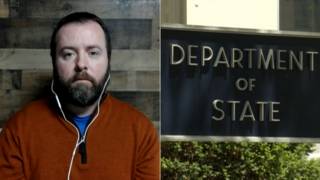
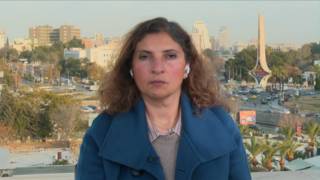
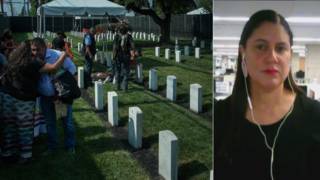
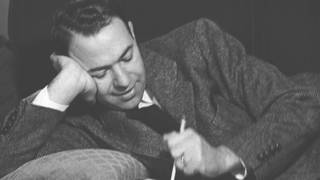





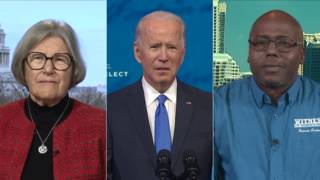
Media Options